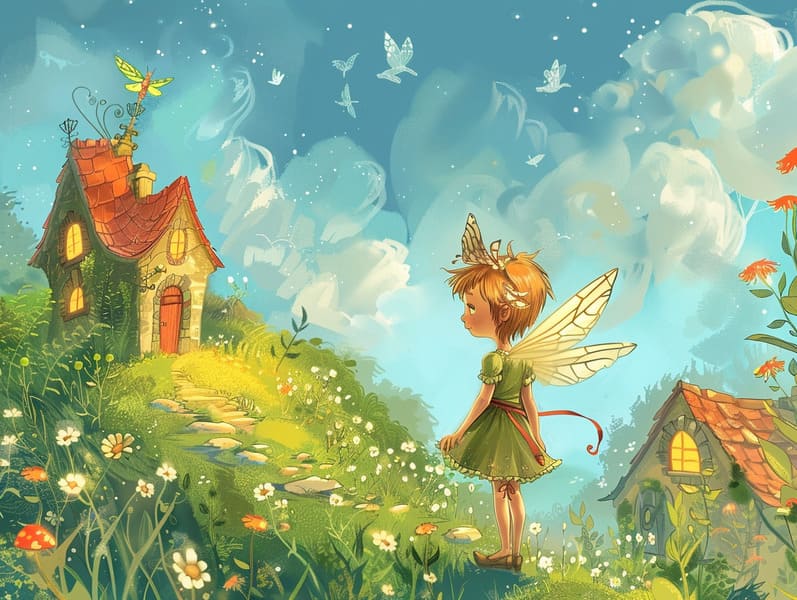Understanding the Wonder of Evening Tales: Building Cherished Memories with Your Family
Understanding the Wonder of Evening Tales: Building Cherished Memories with Your Family
Blog Article

Sleepy time is a special time for caregivers and children. It’s a occasion to settle down, nestle in, and experience the joy of nighttime tales.
For ages, bedtime stories for kids have been a prized practice, offering more than just a way to nod off. They provide an chance for affection, discovery, and igniting imagination.
Benefits of Bedtime Stories
Sleep stories for kids mean more than a way to wrap up the day. They play a important role in a child’s maturation and in reinforcing the parent-kid tie. Here’s why they are beneficial:
1. Shared Moments: Reading together at bedtime fosters a special moment of connection between caregivers and children. It’s a moment of togetherness that helps children feel valued and comforted.
2. Speech and Language Skills: Experiencing stories helps children develop their speech skills. They acquire new language, understand form, and enhance their attention and comprehension abilities.
3. Creative Development: Children's tales move them to fantastic worlds, promoting creativity. They see characters, settings, and adventures, which sparks their creativity.
4. Emotional Skills: Nighttime tales often showcase characters facing difficulties and feelings. These narratives help kids handle and process their own sentiments, developing emotional skills.
5. Brain Growth: Listening to a tale helps children develop concentration, remembering, and reasoning skills. They gain to follow lines of thought, remember details, and predict outcomes.
Integrating Bedtime Stories into Your Night
Developing a night-time practice that involves reading stories out loud is straightforward and gratifying. Here’s how to make it a beloved part of your nightly habit:
1. Choose a Relaxing Place: Select a snug place where you and your child can relax without distractions. A cozy bed or a snug reading nook works beautifully.
2. Establish a Routine Time: Pick a routine time each night for storytime. Regularity helps children be prepared and makes the habit easier to follow.
3. Choose Age-Fitting Stories: Identify tales that suit your child’s cognitive level. Small children might like picture books with basic stories, while older kids may like chapter books with more complex plots.
4. Engage with the Story: Turn the tale be captivating by doing different accents and voices, adding story sounds, and asking your child to be involved. Ask stuff about the story to keep them listening.
5. Create a Soothing Environment: Turn down the lights, use soft voices, and create a tranquil environment to help your child ease into rest.
Where to Locate Bedtime Stories
There are numerous choices where you can find fantastic bedtime stories for children. Here are some ideas to try:
1. Books for Kids: Check out your nearby library or bookstore to find a wide selection of bedtime stories for kids. Exploring the aisles together can be a entertaining activity that also allows children to get stories that they are drawn to.
2. Web Sources: There are many internet sites that offer free bedtime stories. Sites like kids' story platforms provide a variety of short stories for kids that you can read online. These resources are great for finding new and assorted stories without paying.
3. Audio Stories and Apps: For nights when you’re too drained to read, look into audiobooks or storytelling apps. These can provide a quiet narration to read your child a story, ensuring they still get their bedtime story fix. Apps often offer fun elements that can keep kids interested further.
4. Unique Stories: Craft your own stories reflecting your child’s experiences. Personalized stories can be very engaging and meaningful. You can involve your child in the development process, making them a part of the adventure.
Short Story Benefits
Short stories for kids are extremely great for bedtime. They provide all the good points of longer stories but are more brief, making them perfect for getting ready for bed before sleep. Here’s why short stories are a great choice:
1. Simple and Clear: Brief tales are simple and effortless for children to follow, even after a long day. They can promptly grasp the story and enjoy the story without getting lost.
2. Rapid Interest: Brief tales immediately engage children, keeping their involvement and interest. This makes them excellent for keeping bedtime routines easy yet enjoyable.
3. Various Options: Quick stories make possible for variety in your bedtime books. You can choose a different story each night, keeping the practice exciting and exciting for your child.
4. Time Management: For busy parents, quick stories are a fast way to confirm children still get their nightly dose of storytelling. They fit well into a packed schedule while still offering the full positives of a bedtime story.
The Comfort of "Read Me a Story"
The simple phrase, “Will you read to me?” can open a world of magic for children. Complying to this request not only fulfills a child’s wish for attention and engagement but also builds lasting moments. Here’s why it’s special:
1. Link: Sharing stories to your child develops a deep emotional link. It’s a time for attachment, sharing, and bonding.
2. Heritage: Starting a bedtime story habit creates a valued tradition that children anticipate every night. It’s a routine that can be transferred through generations.
3. Joint Growth: As you share stories, you’ll experience your child’s development and progress. Their reactions, reactions, and understanding of the stories change, offering insights into their developing minds.
4. Safe Environment: Bedtime stories provide a safe space for get more info children to examine emotions, face fears, and find comfort in the trusted presence of a parent.
The Last Word
Children’s bedtime stories are a important tool for supporting a child’s maturation and developing unforgettable experiences of connection.